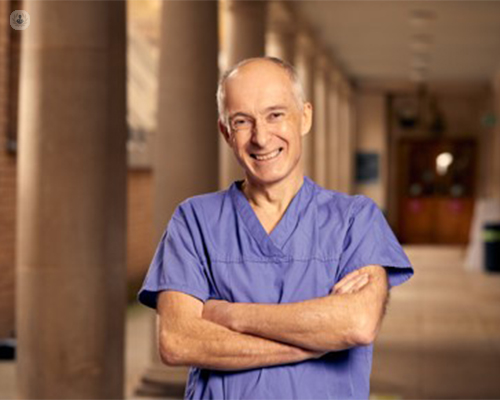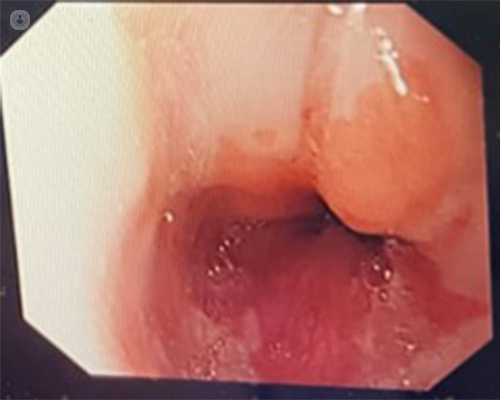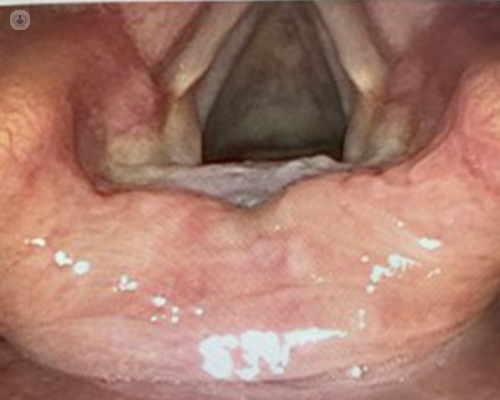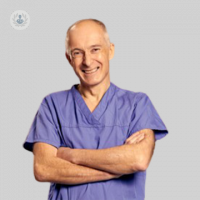Doctors’ changing views on reflux and the throat: laryngology 3.0
Escrito por:When I started out as a young doctor, when Disraeli or someone was Prime Minister, we used a combination of mirrors to look at the throat, an exotic exercise involving a mystical-looking purple liquid in a genie bottle that fuelled a flame to warm the mirrors. In those days, if you had throat symptoms, we would perform this magic trick and then declare that either there was a lump that we needed to biopsy, or that there was no lump and you should go forth back into the world, symptoms or no. Sort of laryngology (“throat-ology”) 1.0.

Then, in the 90s, came the nasendoscope and suddenly we could see more, for longer, and even share our view with other doctors and patients. At the same time, Dr Jamie Koufman, a brilliant but maverick ENT US doctor, started a new movement: the church of "laryngopharyngeal reflux" (LPR). With religious zeal, she travelled the world, spreading the word that there was now a Third Way: lump, no lump/go away, or LPR. ENT doctors suddenly had something new to say to people with throat symptoms. Blaming everything non-lumpy (and some lumpy as well) on acid reflux gave doctors something to treat with tablets and made them feel better about their practice, more New World, more laryngology 2.0. It also made patients feel better, too: they weren’t being sent away as though either unimportant or mad, they were being taken seriously and given something that would make them better.
And the majority of patients with throat symptoms do indeed get better on anti-reflux medication: some of them actually do have reflux-related problems (maybe a third of non-lumpies), other problems resolve on their own with or without treatment, and even Smarties would give a 30 to 40 per cent placebo benefit regardless. Numerous randomised trials have shown no difference between treating diffuse throat symptoms with anti-reflux medications or with Smarties (or similar). Anyway, “whatever”, you cry, it works for everyone all round: patients, doctors, Jamie’s church, and, of course, the pharmaceutical companies’ shareholders. All of which brings us to laryngology 3.0 (or maybe 2.5).

Multidisciplinary care between GI physicians and surgeons and laryngologists
is the gold standard and way forward. Photo by Professor Birchall.
There are drivers to do better than this. Firstly, and most importantly, there are patients with persistent, sometimes life-altering, symptoms, that simply don’t respond to simple anti-reflux treatment, and an equal number who don’t want to stay on these drugs for years (another bonus to the Big Drug companies is that if you just stop proton-pump inhibitors, the commonest anti-reflux drugs, you develop rip-roaring heartburn within 24 to 48 hours as rebound acid production steps up, so people just start it again…you can wean carefully, however, with Gaviscon advance for any symptoms during the cold turkey period).
At the same time, doctors realise that the science behind all this is at best sketchy. We (including me) do believe that problems with the oesophagus, stomach, and maybe lower in the GI tract can cause significant throat problems. We just need to unpick what exactly are the pathological mechanisms for this and then we can make diagnostics and treatments much more effective. This will allow us to pick those patients who will benefit most from therapy, pick the therapy that works for each person, and thus reduce drug use and improve lives.
Much needs to be done. A big start is more communication and joint clinical and research working between ENT/laryngologists and gastroenterologists and physiologists. This kind of multidisciplinary working is more resource-intensive for health systems, but is rapidly becoming the gold standard, facilitated by the COVID-19-induced acceleration of electronic working (shared sites, electronic patient records, rapid secure exchange of images, and virtual team meetings (MDTs). Examples of the progress that this approach is now making include a realisation that non-acidic reflux and pharyngeal aerosol generation, as well as changes in bowel flora (e.g. SIBO, small intestinal bacterial overgrowth) can underlie persistent symptoms such as chronic cough, lump-in-the-throat (“globus”), and hoarseness.

We are working to better diagnose and treat people with throats like this. Photo by Professor Birchall.
I am privileged to work with a stunning array of talented colleagues from gastroenterology, upper GI surgery, GI physiology, specialist speech and swallowing therapists, and others. This, with the spectacular views from high-tech endoscopes, has transformed my ability to personalise care for individual patients. The regular interactions with academic doctors and therapists from diverse specialities is continually improving my understanding and, hopefully, care for those with throat symptoms.
I miss my magic purple lamp, all the smoke and the mirrors, sometimes. Probably, in 30 years’ time, our “modern” methods will be viewed as just as arcane. However, right now, welcome to laryngology 3.0. Its bigger, clearer, and better for you, the person whose throat symptoms need disposing of. Just like our preconceptions of LPR and my old laryngeal mirror.
If you are experiencing problems in the throat and would like a consultation with Professor Birchall, you can go to his Top Doctors profile and schedule a visit.


